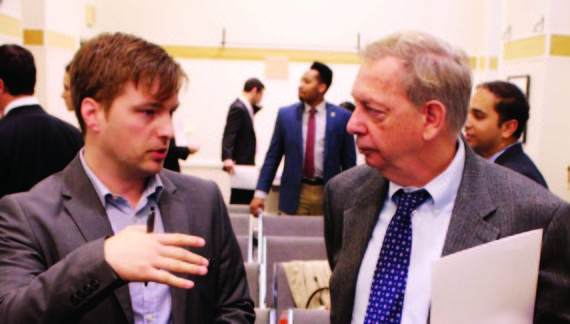WASHINGTON – Flags silhouetted Columbus Fountain as chants against mass surveillance reverberated from Union Station’s marble façade.
Protesters from all over the country spoke out against bulk data collection in a two-part assault with congressional lobbying Oct. 24 and a rally the next day.
“Our government is spying on everyday Americans, and we want it to stop,” Michelle Richardson, legislative council for the American Civil Liberties Union, said.
The lobbying was organized by Public Knowledge, a group dedicated to working on issues of copyright, telecommunications and Internet policy. People were briefed about how to talk with House members and senators and what specific points to emphasize.
“The fact that you’re a constituent and you traveled all the way to stop at their office makes a tremendous impact on them. They take note of that.” Chris J. Lewis, vice president of government affairs at Public Knowledge, said.
They had more than 50 meetings scheduled with legislators, including members of the Senate Judiciary and Homeland Security Committees, throughout the day.
On Saturday hundreds gathered in front of Union Station and marched to the Capitol Reflecting Pool. Steve Lane, 73, a retired resident of Bethesda, Md., came to the rally because he said inaction spoke as loudly as rallying did.
“If I don’t say anything, it’s like I’m saying that spying is OK,” Lane said.
The catalyst for the rally was originally the leaks by former government contractor Edward Snowden, who was touted as almost a hero-like figure at the event. However, the timing couldn’t have been better for the rally. Just days before, news organizations reported that the NSA had intercepted calls from German Chancellor Angela Merkel’s cell phone.
On Tuesday, the NSA director, Army Gen. Keith Alexander, was questioned about the foreign intelligence operations as members of the House Intelligence Committee discussed possibly modifying the Foreign Intelligence Surveillance Act.
As stated in their letter to Congress, one of Stop Watching Us’ goals is to get the FISA and the PATRIOT Act reformed. They also hope to get Congress to create a committee dedicated to investigating domestic spying and to hold accountable people responsible for “unconstitutional surveillance.
Nick Prete is a junior multimedia journalism major. He is currently participating in the Scripps Howard Foundation Semester in Washington program. He may be reached at [email protected].






